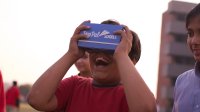How Students Can Meet Their Peers All Over the World
Global exchanges let students from anywhere in the world meet online and experience different cultures.
Your content has been saved!
Go to My Saved Content.When was the last time your students were in touch with a peer in Kenya, Poland, or Bolivia? One benefit of distance learning has been the chance to bridge distances through global exchanges. Student-to-student connections across many nationalities, ethnicities, and cultures bring the world into the classroom. The power to communicate across borders and the ability to collaborate with people of diverse backgrounds is a key 21st-century skill.
International peer-to-peer exchanges enable students to do the following:
- Discover how much they have in common with people who live in other places
- Learn to value similarities with and differences from people from different backgrounds
- Open their minds to the amazing diversity on our planet
- Learn alternative ways of thinking and new solutions to problems
- Come to feel empathy for those who have great challenges
- Develop the compassion that gives them a sense of purpose and calls them to make the world safer and more equitable for all
Distance learning platforms, with all their limitations, allow educators to shine a spotlight on diversity and intercultural exchange and offer new possibilities for connecting.
IDialogue
, an international distance learning website founded by Natalia Bout, an educator from Russia and cultural enthusiast, offers a variety of authentic student-to-student learning opportunities in English. So far this year, they’ve already reached more than 7,000 educators and 100,000 students in different locations worldwide.
As a student in India wrote, “When I log into iDialogue from India and read the posts of students from other countries... I think I better understand their mentality and this is very unusual, for me iDialogue is like a window to another dimension.”

Discussions, Debates, and Virtual Field Trips
Students express opinions in moderated forums as they develop critical thinking skills and an understanding of the value of hearing multiple perspectives. �鶹��ý��� and modes of communication vary based on student interest. In response to a question about the impact of the pandemic on their lives, for instance, , made a video about life in quarantine that featured her infant niece and her cat.
A Polish boy, Alex, wrote, “For happiness, a person needs 8 kisses and 7 minutes of hugs per day. How to be happy during the period of strict quarantine and self-isolation?” Faustyna replied, “The warmest hugs will be when the quarantine is over.”
In response to the question, “What is the power of knowing different languages?” Ricardo wrote, “I speak Spanish and Quechua and am learning English.” Antoni replied, “I am proud of such people, although my grandmother knows only Polish... and she is a wonderful person.”
Students are invited through monthly “challenges” to create a video or photographic entry. Everyone votes on their favorite submissions, and prizes are awarded. In one challenge, students were invited to share why they were proud of their hometown. Five high school students about their hometown, Durrës, Albania. Two Turkish 9-year-olds , “With its warm atmosphere, charming landscape, fresh air and water Bolu is one of the best places to live in.”
In another challenge activity, #MagicWinter, students from more than 140 countries submitted entries about how they celebrate holiday traditions. One of the winners, , wrote, “Saraswati Puja is my favourite among them. This festival marks the end of winter and welcomes the arrival of spring. May the world see peace, happiness and healthy year 2021.”
Teachers can also sign up for collaboration from one classroom to another, where students engage in live video exchanges and lessons as well as multimedia file sharing. IDialogue’s platform matches grade levels and facilitates scheduling and navigating time zones. They’ve also hosted virtual field trips to see giraffes in Kenya, meet NASA astronomers, and explore downtown Vienna. Students propose places where they’d like to go and then post about their experiences.
Other Global Projects
There are many types of virtual global projects where students meet peers and exchange feelings, opinions, and perspectives. Here are a few more:
- UNICEF (grades K–12) invites students to share opinions on global issues. On the topic of climate change, a 17-year-old climate activist from Dominica shared a photo-essay. A teen from Zimbabwe described his climate change activities. On the topic of racial justice, Voices of Youth invited students to submit poetry.
- (grades K–12) is another platform where students from many countries interact through virtual messaging or videos and participate in collaborative projects.
- (grades 6–12) is a free, online study abroad experience that matches students with a peer from a different country. They engage in weekly video calls and activities to simulate an authentic study abroad experience.
These activities widen horizons and help students develop a sense of . They learn to value their own identities and feel that who they are and what they think matters. They also come to appreciate and accept others. As young people grow up in today’s increasingly interconnected and diverse world, not only their personal success in life but the future of all people on this planet will depend on our ability to interact, cooperate, and learn with others who are different.
